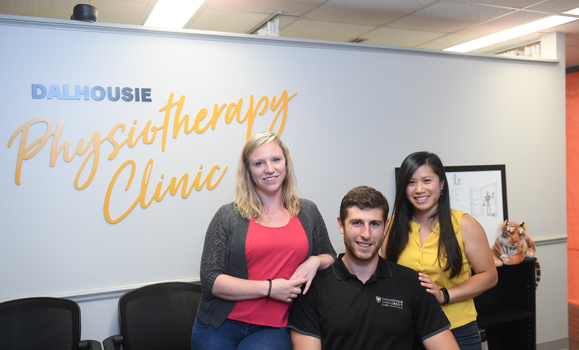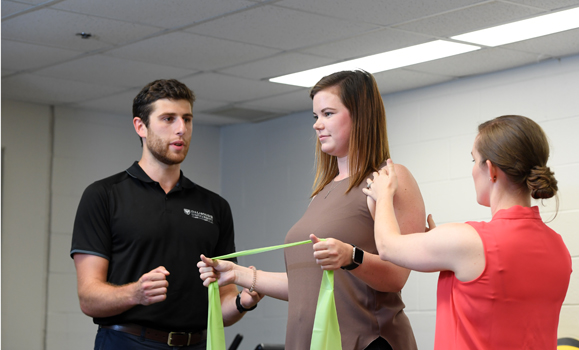The Dalhousie Physiotherapy Clinic opened its doors for service last December and its first cohort of students recently finished their placements.
A partnership established between the Faculty of Health's School of Physiotherapy and the Department of Athletics and Recreation, the clinic links patient care with student education under the supervision of licensed physiotherapists. It also allows the School of Physiotherapy to conduct cutting-edge clinical research to improve its services and programming.
Dal News caught up with three of the first MSc Physiotherapy students to complete their placements at the clinic to discuss their experiences and the insights they gained from working with the clinic’s patients.
Dal News: What do you think is the most important thing you learned during your placement and how do you think it will help you in the future?
Jodi Brake: “I feel like getting hands on experience in the Dal Physio Clinic was a really good way to learn time-management skills, which will be very helpful in future work settings where I might have less time to handle more patients, so learning how to optimize my time was a very, very valuable lesson.”
Ben Firth: “The most important thing I learned was interacting with actual patients. In the classroom and lab settings we’re learning hands-on techniques and treatments, but then during our placements we get a chance to apply them during our patient interactions. Learning from [Dal Physio Clinic Manager] Rhonda [Reardon]’s experience will definitely help me as I move forward as a physiotherapist in the future and deal with different work environments, patients and treatment techniques.”
Olivia Cheng: “I can’t say it’s one most important thing, because it’s definitely the combination of everything together. There are different therapists as well as support staff and physio assistants. The most important thing to me was having the freedom in terms of really learning the expertise from my clinical instructor. Also learning from the assistants, seeing that teamwork and how it all worked together, was a really big thing.”

Dal News: How do you feel this experience has impacted your overall learning?
Jodi: “I think having my first placement at the Dal Physio Clinic has given me a different variety of experiences because many first-year students are placed in hospital settings. I think having been placed at the clinic was an asset to learn how things can be different from a hospital and it’s very likely that most physiotherapist graduates won’t work in hospitals. It was great to see the pace, the differences and the variety of injuries. I really think that was crucial to my learning.”
Ben: “I’ve learned a lot from this this placement, especially being able to watch and observe how Rhonda works because she’s so experienced. It was great to see the different types of exercises, modalities and manual therapies she used. It gave me a chance, under Rhonda’s supervision, to practice the delivery of the exercise prescriptions, manual therapy, and hands-on techniques on patients. Rhonda’s feedback definitely enhanced my learning.”
Olivia: “I think all my experiences do impact my overall learning, and this was my first ever placement so it really opened up what the first-time delivery of any kind of physiotherapy is like. Also learning the very basic things, like writing what we call “SOAP notes,” which, summarize what happened with each client. Working with the patients and seeing progress gave me insight into how to be a physiotherapist. You can see how much impact physiotherapy has on clients, which is pretty amazing.”

Dal News: Do you think having the experiential learning component of your program sets you apart from other students? Why or why not?
Jodi: “I do actually, because … it gave me an opportunity to see a different work environment that you wouldn’t necessarily get in a hospital. So I did enjoy that. I also found it different having kinesiologists to help in the clinic versus physiotherapists in the hospital. I definitely feel it gave me almost a one-up in the sense that I got to do a placement at a clinic first and will have a little bit more experience and a little bit more comfort with that going forward. Most students have one placement at a clinic throughout our five placements, and I will most likely have two, so it gets me a little more comfortable and I think that’s valuable.”
Ben: “It would be hard to say if the experiential learning component sets me apart from other students. I haven’t had their experience, but it was definitely a different experience. I know this was one of the only private practice placements that was available. Learning from Rhonda is definitely unique, because of her depth of experience, but also because she knows the School of Physiotherapy’s curriculum well. The whole team at the Dal Physio Clinic, provided a very welcoming environment. It was certainly a positive experience and I learned a lot.”
Olivia: “I do think that I was really lucky to have this placement, because being my first placement, I learned so much about the diversity of the caseload and being exposed to different types of conditions. The Dal Physio Clinic itself is conducive for learning because the staff and even the patients themselves really understand what it means to be a student and they’re very supportive of that. It’s a very student-based environment.”

